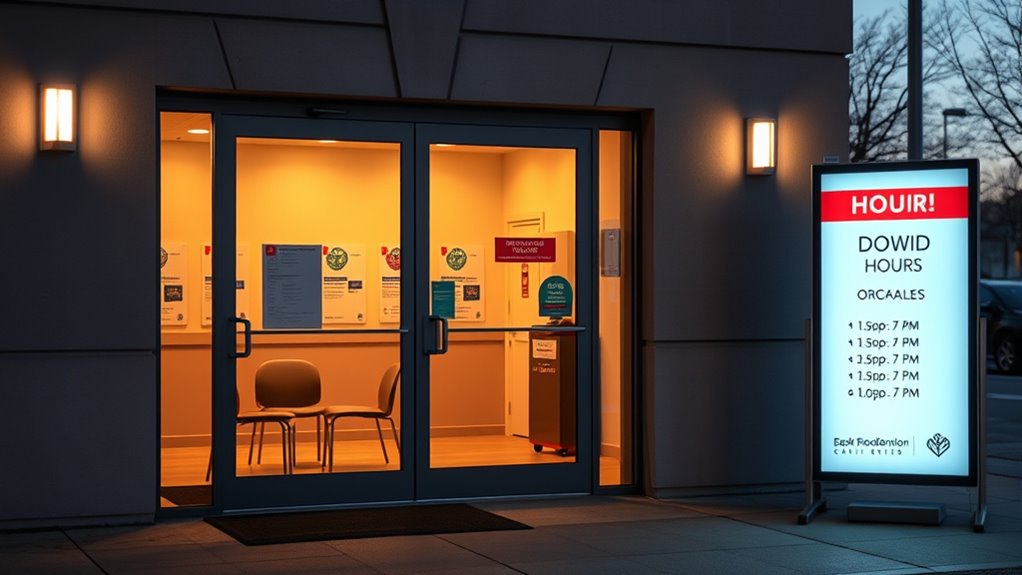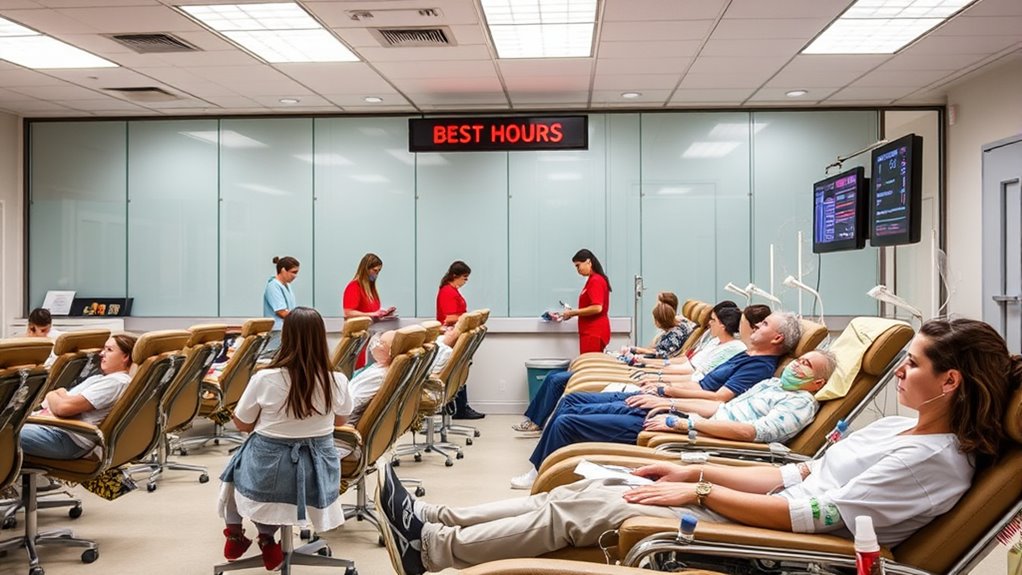Most blood donation centers open early Monday through Saturday, with weekdays—especially Monday or Tuesday—being the best times to visit for shorter wait times. Mornings tend to be less crowded than afternoons or weekends, which often see longer queues. To avoid long waits, it helps to schedule an appointment ahead of time. Continuing on, you’ll discover more tips to find the ideal time that fits your schedule and supports a steady blood supply.
Key Takeaways
- Visit early mornings on Mondays or Tuesdays for shorter wait times and less crowded centers.
- Weekday late mornings or early afternoons typically have fewer donors.
- Schedule appointments in advance to reduce wait times and ensure availability.
- Avoid weekends, especially Saturdays, when centers are usually busier and more crowded.
- Check current hours and availability, as some centers have extended or special hours due to community needs.

Blood donation centers typically operate Monday through Saturday, with most closing on Sundays. Knowing their hours helps you plan the best time to donate blood, ensuring a smooth donation experience. During the blood collection process, staff carefully monitor your health, taking steps to ensure your safety and comfort. Before donating, you’ll need to meet specific donor eligibility requirements, such as age, weight, and health status. These requirements help maintain a safe environment for both donors and recipients. When you arrive, staff will verify your eligibility, ask about your medical history, and conduct a quick health check before proceeding.
Blood donation centers operate Monday through Saturday, ensuring a safe and monitored process for donors.
Most centers open early in the morning, often between 7:00 AM and 9:00 AM, which is ideal if you want to avoid crowds and reduce wait times. Early weekday mornings, especially Monday or Tuesday, tend to be less busy, making it easier to donate without long waits. Midweek late mornings or early afternoons are also less crowded than weekends, giving you a more convenient donation window. Weekends, particularly Saturday, tend to be busier since many people prefer to donate when they’re off work, which can lead to longer wait times if you arrive without an appointment.
Scheduling your donation in advance is highly recommended. Many centers allow you to book appointments online or by phone, helping you choose a time that fits your schedule and reducing wait times. Walk-ins are usually accepted but may involve longer waits, especially during peak hours. During high-demand seasons or blood shortages, centers often prioritize appointments to better manage donor flow. Some centers even send reminders or alerts about upcoming donation opportunities, encouraging regular donors to participate consistently. Appointment scheduling makes the process more efficient for both donors and staff.
The best days and times to donate are typically early in the week, such as Monday or Tuesday mornings, when fewer donors are present. Donating during these times not only shortens your wait but also helps centers maintain a steady blood supply, especially during holidays and summer months when donations tend to dip. It’s important to follow aftercare instructions, like staying hydrated and avoiding heavy meals or strenuous activity before donating. These steps help ensure you remain eligible and comfortable during the blood collection process.
In recent years, the pandemic has affected donation hours and schedules, prompting some centers to adjust their hours or run special drives with extended or weekend hours. Despite these changes, the importance of regular donations remains critical. The centers continue to adapt their hours to meet community needs, allowing more people to donate at times that suit their schedules and helping to ensure a reliable blood supply. Knowing the typical hours and planning your donation around less busy times can make a significant difference. By understanding the blood collection process and meeting donor eligibility requirements, you help ensure a safe, efficient donation that supports the ongoing need for blood in hospitals nationwide.
Frequently Asked Questions
Can I Donate Blood if I Feel Slightly Unwell?
You shouldn’t donate blood if you feel slightly unwell, as it violates health precautions and affects donation eligibility. Your body needs to be in good health to ensure a safe donation process and to avoid risking your recovery. When you’re feeling under the weather, it’s best to wait until you’re fully recovered. This helps protect both your health and the quality of the donated blood for recipients.
Are Weekend Hours Different From Weekday Hours?
They say timing is everything, and that’s true for blood donation hours too. Weekday hours are usually longer and more flexible, with walk-ins often accepted, making donation timing easier. Weekend hours tend to be shorter and may require appointments, but they’re perfect if weekends are your only free time. Comparing weekend vs. weekday hours, choose what’s most convenient for you to keep the donation process smooth and stress-free.
Do Holidays Affect Blood Donation Center Hours?
Holidays can impact blood donation center hours through holiday closures and seasonal hours adjustments. You might find centers open with limited or altered hours during major holidays, so it’s wise to check ahead. Some centers offer special holiday hours or appointments to encourage donations. Planning your donation before or after holidays ensures you help maintain a steady blood supply, especially since seasonal hours can reduce availability and affect donation opportunities.
Is There a Preferred Time After Eating to Donate?
Timing is everything, especially when it comes to donating blood. You should donate a few hours after a light meal, following fasting guidelines, to prevent discomfort and dizziness. Eating too close to donation can cause nausea, so aim for a gap of at least 2-3 hours. This guarantees your blood donation goes smoothly, and your body recovers quickly. Remember, your health comes first—donate when you’re well-fueled but not overly full.
How Long Should I Wait Between Donations?
You should wait at least 56 days between whole blood donations to allow proper recovery time after donation. For double red cells or power red donations, wait at least 112 days. Platelet donations can be done every 7 days, up to 24 times a year, while plasma donations require a 28-day interval. Following these blood donation frequency guidelines helps guarantee your health and safe recovery after each donation.
Conclusion
If you want to make the biggest impact, consider donating during late mornings or early afternoons when centers are less crowded. Some believe donating at peak hours might reduce your donation’s effectiveness, but studies show that your blood quality remains consistent throughout the day. So, pick a time that works best for you, knowing your generous act can save lives no matter when you donate. Every drop counts—trust the facts and donate confidently!
Albert is the visionary leader and editor-in-chief of Hours Today List. With a keen eye for detail and a relentless commitment to accuracy, he oversees all content that goes live on our platform. His expertise in curating, editing, and ensuring the reliability of our listings is unmatched. Albert’s leadership inspires and drives the entire team towards excellence. Under his guidance, Hours Today List has grown into the trusted resource it is today.











